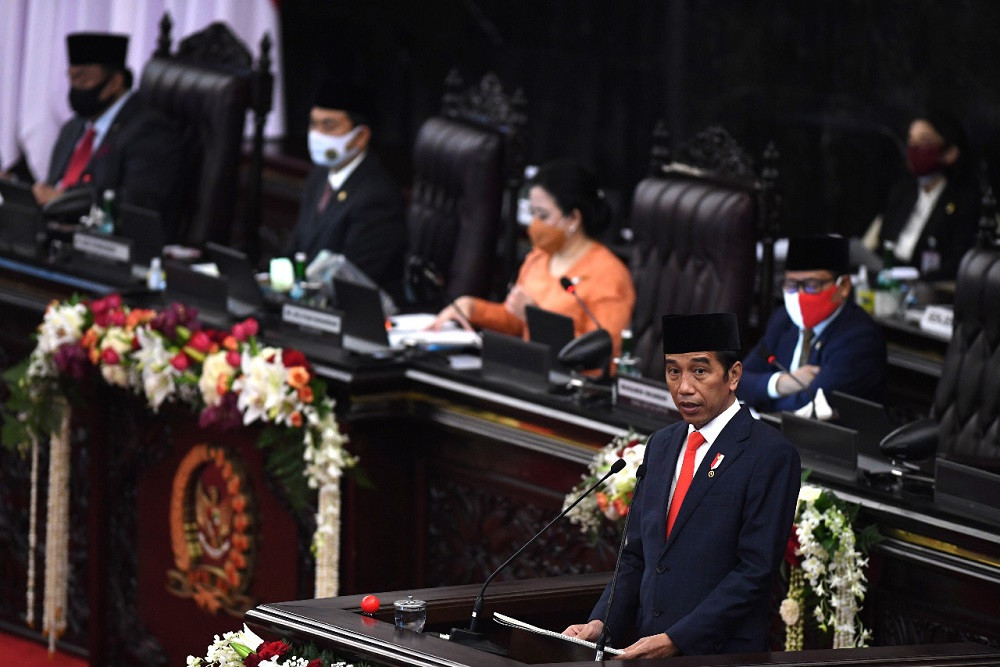Will the government's debt be sustainable in 2021?
Amid these uncertainties, one thing is certain: the Indonesian government’s debt will soar to unprecedented levels in 2021.
Change Size
 Budget talks: President Joko “Jokowi” Widodo unveils the draft state budget for the 2021 fiscal year in a plenary session of the House of Representatives on Aug. 14. The session was held in compliance with health protocols to reduce the risk of COVID-19 transmission. (Antara/Akbar Nugroho Gumay)
Budget talks: President Joko “Jokowi” Widodo unveils the draft state budget for the 2021 fiscal year in a plenary session of the House of Representatives on Aug. 14. The session was held in compliance with health protocols to reduce the risk of COVID-19 transmission. (Antara/Akbar Nugroho Gumay)
T
his is a precarious time for all governments as they seek to prepare their budgets. They do not know when the disastrous pandemic will end, and they do not know what the final shape of the world economy will be after being swept by the pandemic, a severe recession, the highest levels of debt and bankruptcies on record and deglobalization.
Without knowing the full outcome of these developments, the credibility of the budget will be in doubt, as the spending plan is likely to be based on shaky assumptions.
In preparing its 2021 draft state budget – which President Joko “Jokowi” Widodo submitted to the House of Representatives on Aug. 14 – the government was realistic enough to acknowledge these uncertainties. Even amid the talk of a recovery next year, government expenditure is projected to increase by only Rp 9 trillion (0.3 percent) to Rp 2.74 quadrillion (US$185 billion) in 2021, perhaps the smallest expenditure increase on record. With such a tiny increase and with lower deficits (from 6.3 percent of GDP to 5.5 percent of GDP) it is hard to see the 2021 budget as a fiscal stimulus. It is also not supportive of the projected growth of 4.5 to 5.5 percent.
The government has resigned itself to the fact that after huge tax cuts, tax relief and tax incentives, and amid low commodity prices, it cannot expect the recovery of its revenue to pre-COVID-19 levels any time soon. It projects tax revenue to total Rp 1.48 quadrillion in 2021, which is lower than in 2018 and 2019.
But amid these uncertainties, one thing is certain: the Indonesian government’s debt will soar to unprecedented levels in 2021.
Read also: Indonesia’s 2021 state budget draft: What we know so far
Total government debt as of June 2020 stood at Rp 5.26 quadrillion (32.7 percent of GDP). Given the planned government bond issuance in the second half of 2020, the debt will increase to Rp 6.16 quadrillion (38.3 percent of GDP) by the end of 2020. In the 2021 proposed budget, the government projects its debt financing to be Rp 1.14 quadrillion, which will further raise government debt at the end of 2021 cumulatively to Rp 7.3 quadrillion, or 41.4 percent of GDP. Although this is still lower than the legal ceiling of 60 percent of GDP.
Amid the 5.32 percent economic contraction in the second quarter of 2020, total Indonesian foreign debt rose to $408.6 billion by the end of June, an increase of $9 billion.
Although that level of debt is the norm in many countries, for Indonesia it could have political ramifications, making the government more vulnerable to sharp criticisms and the political noise created by opposition parties.
The soaring government debt is one of the major factors affecting the economy, not only because of its impact on market confidence, but also because of the rising cost of its interest.
The interest paid by the government on its debt will soar to 2.2 percent of GDP in 2021, from an average of 1.7 percent of GDP in the last decade. As more funds will be allocated for debt servicing, expenditure for other growth supporting sectors, such as infrastructure, will be constrained.
The jump in interest costs is not only due to the increase in the nominal amount of debt value but also due to the higher yields on Indonesian government bonds, which are far higher than the costs Indonesia’s peer will have to pay on their debts (bonds)
As of July, the yield on 10-year Indonesian government bonds was 6.83 percent, the highest among emerging countries, except for Ukraine and South Africa. At the same time, the bond yield in Thailand was 1.22 percent, Malaysia 2.59 percent and the Philippines 2.74 percent.
The reasons for this wide gap, which reflects the level of confidence of investors in the economy, are not entirely clear as of now. It may have to do with the Indonesian capital market, which is still underdeveloped, lacking depth and sophistication. It may have to do with the credibility of the financial regulators. Or it may have to do with governance issues within the public and private sectors.
The government should find out if there is something fundamentally wrong with the Indonesia’s economic fundamentals.
To ease the government’s debt burden, Bank Indonesia (BI) and the Finance Ministry have agreed on a cost sharing scheme whereby BI has agreed to bear some of the government’s interest cost from the $40 billion debt monetization scheme this year. According to Finance Minister Sri Mulyani, BI might bear Rp 35.9 trillion of the total burden. If realized, this would be a huge burden for BI, because according to BI’s 2019 financial statement, its operational surplus in 2019 was Rp 48 trillion, a decline from Rp 67 trillion in 2018.
The added burden will narrow the distance between BI’s surplus and deficit in its operations and if things get worse, BI’s operations could be in deficit, which would erode its capital. In that case, the government would have to inject capital into BI to maintain its statutory capital of Rp 3.7 trillion. Therefore, BI and the Finance Ministry should be very careful in managing the debt monetization scheme, as the monetary policy will face credibility issues with the market and rating agencies.
Because of the soaring debt, the government should ensure that its debt will be deployed to produce the best results in fighting the spread of the virus and in pulling the economy into recovery next year. Unfortunately, the government has been overwhelmed by the sheer size of the crisis, and it is having difficulties implementing stimulus programs, which are mostly financed by debts. If this cannot be settled, then the sustainability of the government’s debt will be called into question.
***
The writer is an economist and commissioner at a publicly listed oil and gas services company.









